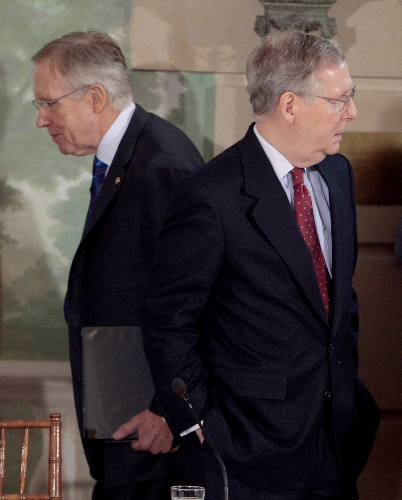Senate to keep filibusters, but try to reduce gridlock
WASHINGTON --The filibuster lives on. The Senate voted overwhelmingly late Thursday to reject efforts to change its rules to restrict the blockades that have sown gridlock and discord in recent years on Capitol Hill.
Instead, senators settled on a more modest measure to prevent single lawmakers from anonymously holding up legislation and nominations, and the parties' Senate leaders announced a handshake deal to conduct business in a more efficient and civilized way.
The two leaders, Democrat Harry Reid of Nevada and Republican Mitch McConnell of Kentucky, also endorsed legislation, to be drawn up later, to break the logjam of confirmations of presidential appointments.
Senators were emphatic in their votes against limiting the filibuster, a treasured right of minorities trying to prevent majorities from running roughshod over them. Many Democrats, while now in the majority, envisioned a day, perhaps as early as after the 2012 election, when they would return to the minority.
None of the votes would have eliminated all filibusters, which are used to stall action on bills or nominations and require 60 votes to override in the 100-member body. Instead, Democrats pushing for change sought to get rid of filibusters that specifically stop bills from being brought to the Senate floor, and to require senators imposing a filibuster to stay on the floor debating the issue. One proposal would have gradually reduced the 60-vote threshold to a simple majority of 51 as debate proceeded.
The votes were 84-12 against the proposal by Sen. Tom Harkin, D-Iowa to gradually reduce the threshold and 51-44 to reject a proposal by Sens. Tom Udall, D-N.M., Jeff Merkley, D-Ore., and Harkin to end filibusters on motions to advance a bill to the floor, require those initiating filibusters to stay on the floor and to shorten debate time on nominations. A third resolution by Merkley that focused on requiring those filibustering to keep talking on the floor went down, 49-46. All the proposals to change Senate rules would have required two-thirds majorities for approval.
But recognizing the frustration of many senators over the delaying tactics and partisan battles that have paralyzed the Senate in recent years, Majority Leader Reid and Republican leader McConnell said they had agreed on non-binding steps to restore comity and cooperation in the Senate. Under the agreement, McConnell said minority Republicans would block fewer bills and nominations in exchange for a guarantee of more chances to amend legislation.
The Senate has been plagued in recent years by procedural delays, often the result of partisan differences, and public displeasure with Congress was a key factor in the fall midterm elections that saw Republicans recapture the House and increase strength in the Senate. A recent Associated Press-GfK poll showed that 69 percent of the people disapprove of Congress. Only 26 percent view it favorably.
Reid defended the central premise of the filibuster, saying debate without time limits was "in our DNA" in the Senate. But he also said, "We have to act because when abuses keep us from doing our work, they deter us from working together and they stop us from working for the American people."
He said he and McConnell would avoid use of the "constitutional option" where the majority could change filibuster and other Senate rules with a simple 51-vote majority.
Republicans have defended their use of the filibuster, saying it was in response to Democrats limiting the number of amendments they could offer to bills.
The leaders' deal focuses only on filibusters pertaining to "motions to proceed," or attempts to bring a bill or a nomination to the Senate floor. The compromise did not extend to filibusters that block efforts to cut off debate and bring a bill to a final vote.
Merkley, who has helped lead the anti-filibuster campaign with Udall and Harkin, applauded what he called the "modest" steps taken by the two leaders. But he said it removed only one of three walls that now stand in the way of getting legislation through the Senate. In addition to the 60 votes needed to overcome filibusters on motions to proceed, there can also be filibusters on amendments and on ending debate.
Reid and McConnell said the Homeland Security and Governmental Affairs Committee would be asked to put together legislation on reducing appointments subject to Senate confirmation, now about 1,400, by about one-third. The confirmation process can take months, subject nominees to exhausting investigations and eat up Senate time.
They also agreed that the practice of disgruntled senators forcing the clerk to read out amendments in their entirety, which can take hours, will be done away with as long as lawmakers have advance access to the amendment. A resolution offered by Sen. Mark Udall, D-Colo., to enact that change passed 81-15.
The resolution to effectively end the practice of secret "holds," where a single senator, without revealing his or her name or motive, can block votes on legislation or nominations, passed 92-4.
Under the proposal long pushed by Sens. Ron Wyden, D-Ore., and Charles Grassley, R-Iowa, and also sponsored by Sen. Claire McCaskill, D-Mo., senators would have to make public their objections within 48 hours of placing them and could no longer baton-pass their holds to other senators to avoid having to reveal themselves.
Nevada Sen. John Ensign was one of four dissenters, along with fellow Republican Sens. Mike Lee of Utah, Rand Paul of Kentucky and Jim DeMint of South Carolina.
Ensign spokeswoman Jennifer Cooper said he voted to preserve secret holds because he was unsatisfied with another portion of the deal involving the time senators are allowed to review bills before voting.
Stephens Washington Bureau Chief Steve Tetreault contributed to this report.

















